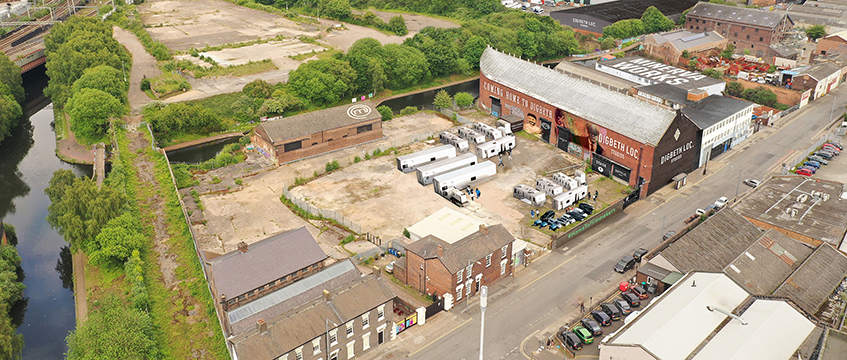A former industrial site in Birmingham’s Digbeth could be key to turning the UK’s second city into a new cultural capital.
That’s the hope of the stakeholders behind Digbeth Loc Studios, a new TV and film production centre, construction on which began last week. The scheme, driven by Peaky Blinders creator Steven Knight, will be the largest such development in the city.
The studios will be open for bookings from July, creating 760 jobs and helping the ongoing regeneration of Digbeth and the growth of the region’s £4bn creative economy. The first filming is expected to take place in October.
Knight has spent the past decade working on the project, alongside Time + Space chief executive Piers Read and with the backing of Brydell Partners. The development has been backed by a £1.3bn investment from Birmingham City Council, together with landowner Homes England and with support from the West Midlands Combined Authority.
As well as three film studios spanning 80,000 sq ft, part of the new studios will be occupied by reggae band UB40, which will use it to encourage upcoming and existing creative talent.

Day in the sun
Launching the project, Knight told EG the creative sector can play a crucial role in regenerating unloved areas of city centres, as well as encouraging economic growth and jobs.
“The creative industries offer opportunities across a wide range of skills – 80% of a film crew is craft, carpenters, sparks and all that, then there are the creatives in terms of writing, producing and directing,” he said. “Then there are opportunities that the creative industries give in a really practical way. This building, I can’t think of another industry that would have a use for that, apart from heavy engineering – which is what it was, and that’s not viable now.
“So the opportunity for creative industries is to take stuff that other people don’t want necessarily – this beautiful, derelict, urban landscape is perfect for us. I don’t think regeneration necessarily comes from grants and bursaries and schemes – it comes from actual stuff that needs to be done, and you have to do it.”
Is the real estate industry ready to change, grasp opportunity like that and do things differently? Knight cut the question off. “No. No. No, I think one of the challenges of this has been vision, trying to impress upon people what this vision this,” he said. “[Real estate professionals] are perfectly good people who have their own set of priorities. They’ll look at this building, it’s not listed, so off it goes, it’s no use. It’s about trying to be less short-term about making a profit and trying to find money that isn’t trying to get out quickly.”
That element of vision is critical, added Time + Space’s Read. “The creative industry is having its day in the sun. But you still need to ensure that what that is has the authenticity to make it a place,” he said. “We always talk about making a place. You have to have people who understand what you are trying to develop and then operate an offer to the creative industries. If you don’t concentrate on that, you end up with something quite bland or something that doesn’t have that creative soul. It’s about the approach.”
Cluster effect
Backers of the plan are adamant they have bought into the vision. At Homes England, interim national development director Alison Crofton said: “We have assembled various brownfield sites in and around the Digbeth area to provide a comprehensive masterplan and development of the area – it’s not done piecemeal… We have picked the best skills of the public and private partners we’ve got to drive the project forward. We want to use this as a great example of what Homes England can do to support local leaders – the only challenge is to keep up that drive that everyone has and make sure we do the best job.”
For West Midlands mayor Andy Street, the promise of Digbeth Loc Studios is just one part of a much larger vision to make Birmingham a new national hub for creative industries.
“We’ll have the Master Chef studio, the BBC headquarters come 2026 in the old Typhoo Tea factory, and two weeks ago we opened the Bond, which is where a number of our creative companies and content producers will all be based,” Street told EG. “So in literally just a few hundred yards, we’ve got a real concentration of assets and we are sure many more will be drawn in. It’s not just about the Digbeth Loc Studios, it’s part of a bigger story about confidence in our sector.”
Is that a new cultural capital? “It is indeed, and it has been very planned for,” Street said. “It’s the theory of the cluster coming together. We talk about an electric vehicle cluster in the West Midlands, but we want, in 10 years’ time, to be just as famous for our creative cluster because a modern, diverse, dynamic city like this needs the creativity to be part of its story.”
To send feedback, e-mail tim.burke@eg.co.uk or tweet @_tim_burke or @EGPropertyNews











